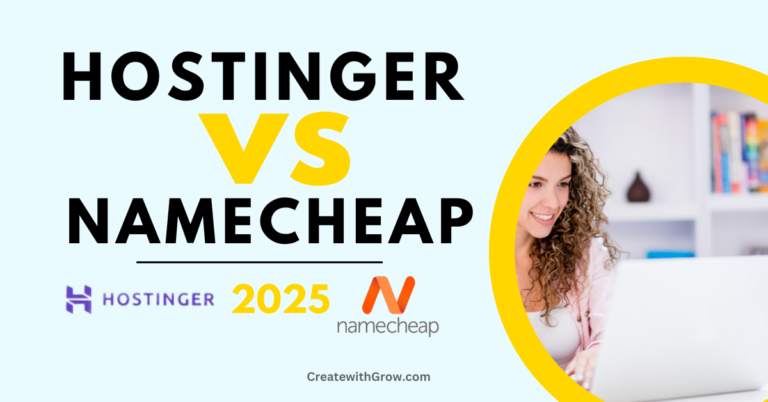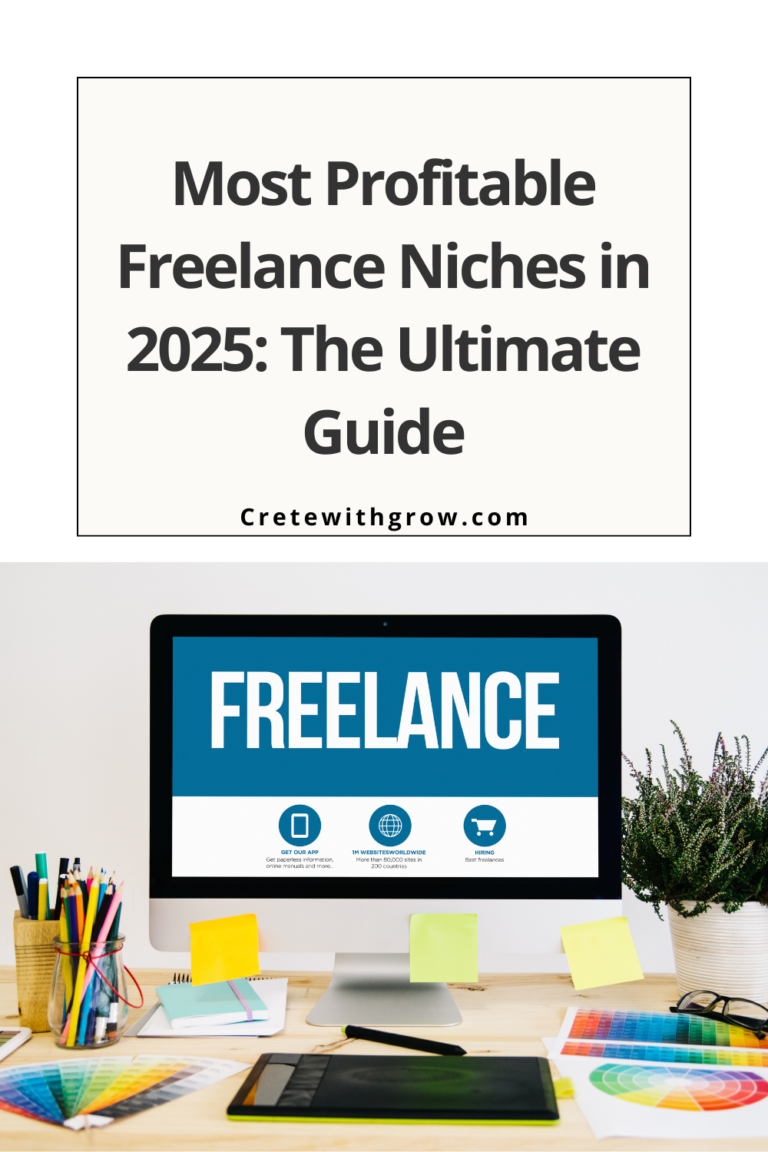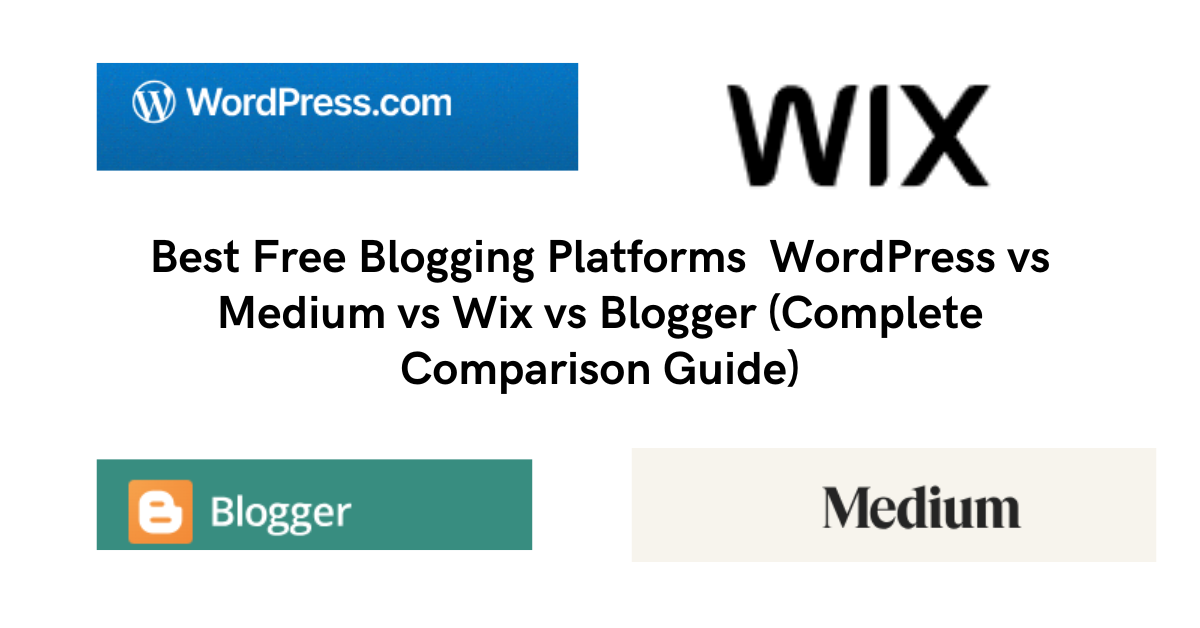
The world of blogging is vast and ever-evolving, with over 600 million blogs competing for attention across the internet. In fact, a staggering 77% of internet users regularly read blog content, making it one of the most influential forms of digital communication today! I’ve spent countless hours testing and working with various blogging platforms, and I’m here to help you navigate this complex landscape.
Whether you’re a passionate writer looking to share your stories, a business owner aiming to boost your online presence, or an aspiring influencer ready to make your mark, choosing the right blogging platform is crucial. Let’s dive into a comprehensive comparison of the top free blogging platforms available.
How to Star Free Blogging Platforms: The Basics
Before we delve into specific platforms, we must understand what free blogging platforms offer. Think of them as your digital home – each with its own unique architecture, rules, and community.
Free blogging platforms provide:
- Hosting services without upfront costs
- Basic design templates and customization options
- Essential publishing tools and features
- Built-in audience potential
- Community support and resources
However, it’s important to note that “free” often has certain limitations. These might include storage restrictions, limited customization options, or platform-specific branding. Understanding these trade-offs is crucial for making an informed decision.
WordPress
- A simplified version of self-hosted WordPress, WordPress.com is a free, all-in-one blogging platform with a user-friendly interface and a good balance of features. It provides basic customization and design options and access to free themes. However, it displays ads on your site.
- Ease of use: ⭐⭐⭐⭐⭐ (5/5)
- Features: ⭐⭐⭐⭐ (4/5)
- Design: ⭐⭐⭐⭐ (4/5)
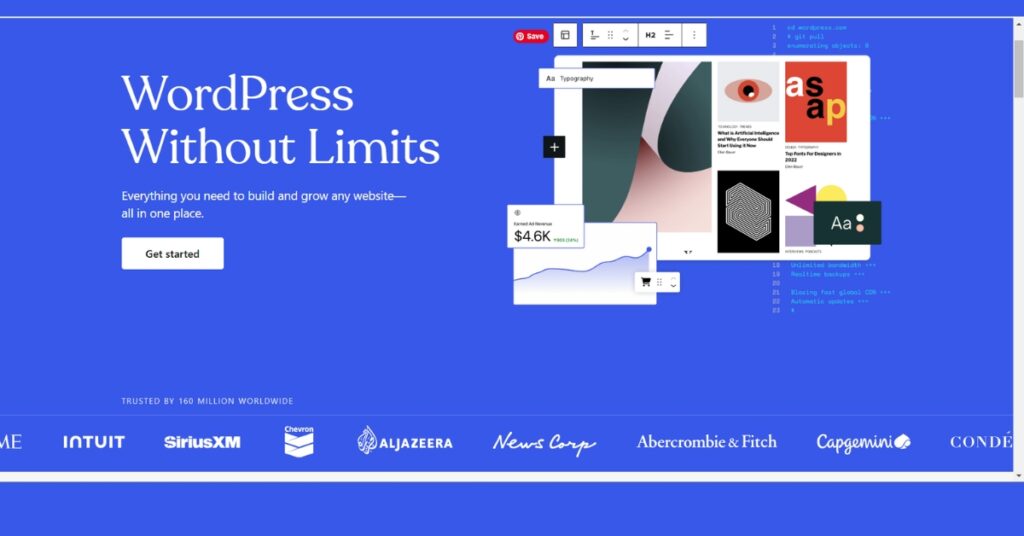
WordPress.com and self-hosted WordPress are different platforms for different users and use cases. Knowing their features, ease of use, limitations, and target audience is important if you’re considering starting a blog or website.
Features and Ease of Use
WordPress is designed for simplicity and ease of use. You can start by clicking the “Get Started” button and following a simple setup process. The user-friendly dashboard lets you easily manage posts, pages, and media. Multimedia integration of images, videos, and audio files is seamless, so it’s perfect for those who want to focus on content creation without technical headaches.
The WordPress mobile app also makes it more usable by allowing you to manage your blog on the go, post updates, and respond to comments. On the other hand, self-hosted WordPress offers more flexibility and control over the design and functionality of the website. You can choose your hosting provider and have full access to the WordPress software to
Free Plan Limitations
While WordPress offers a free plan that’s great for beginners, it has some limitations:
- Subdomain: Free users get a WordPress subdomain (e.g., yourblog.wordpress.com), which may not look as professional as a custom domain.
- Storage: The free plan has only 1GB of storage for media uploads, which can be limiting for those who want to upload high-resolution images or videos.
- Ads: WordPress displays ads on free sites that you can’t control. This can ruin the user experience.
- Feature Limitations: Advanced features like plugins, SEO tools, and monetization options are only available on paid plans. Direct customer support is also only for paying users.
These limitations make WordPress good for personal bloggers or those new to blogging who want a hassle-free setup without any financial investment. However, as users grow, especially in terms of customization and monetization, they may find these limitations frustrating.
Who should use WordPress?
Free plan on WordPress.com is good for:
- Personal Bloggers: Those who want to share personal stories or hobbies without technical headaches.
- Beginners: Those new to blogging want a simple platform to share ideas.
- Minimalists: Those who need basic design options and functionality without extensive customization.
If you want full control over your site’s design or plan to monetize your blog, self-hosted WordPress might be the better option despite the steeper learning curve.
Both platforms serve different purposes. WordPress is good for ease of use and accessibility, while self-hosted WordPress gives more freedom and potential for growth. The choice depends on the user’s needs, technical ability, and long-term goals in web development.
Wix
- A true 100% free option. Wix gives you access to an easy-to-use website, blogging tools, hosting, and a free subdomain. You have practical control of your blog and affordable options if you ever decide to upgrade.
- Ease of use: ⭐⭐⭐⭐ (4/5)
- Features: ⭐⭐⭐⭐⭐ (5/5)
- Design: ⭐⭐⭐⭐ (4/5)
Wix offers a free plan that allows you to create and launch a website and blog without commitment. This plan is perfect for beginners or those on a tight budget.

Features and Ease of Use
Creating a blog with Wix is easy. You can sign up without entering your credit card details and follow the steps to set up your site. The platform has an AI-powered interface that will tailor the site to your preferences. Answer a few questions, and Wix will give you design options to customize.
- User-Friendly Interface: The dashboard is easy to use. You can quickly add blog posts, images, and other content.
- Design Options: Wix offers over 800 templates, so you can choose one that suits your style. However, switching templates after launch can be tricky. It usually requires starting a new site and moving content.
Although user-friendly, some may find the Wix panel overwhelming at first. To get the most out of the platform, get to know the dashboard.
Free Plan Limitations
While the Wix free plan is great, it has some limitations:
- Domain: You get a Wix-assigned URL (e.g., accountname.wix.com/sitename), which is not professional compared to custom domains in the upgraded plans.
- Advertisements: Every page has Wix ads that can’t be removed unless you upgrade your plan.
- Storage and Bandwidth: Free users have 500MB of storage and 1GB of bandwidth, which is not enough for media-heavy websites.
- E-commerce Restrictions: The free plan doesn’t support online payments or e-commerce features.
- Analytics: No Google Analytics to track your website performance.
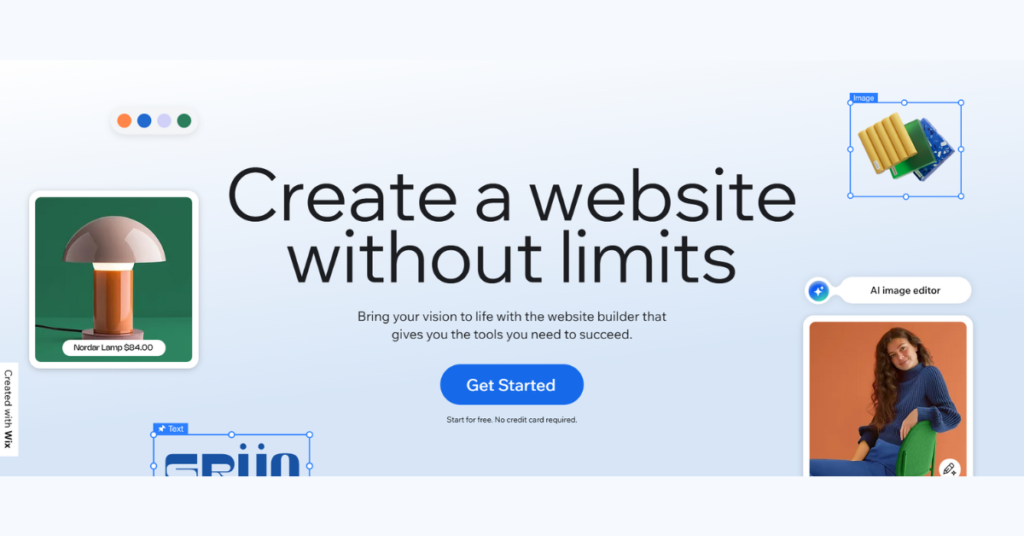
These limitations will hinder professional branding and growth for serious bloggers or businesses.
Who should use Wix as a free blogging site?
The best advantage of starting a free blog on Wix is the easy setup process; you can launch your blog in under 10 minutes. This is perfect for:
- Beginners: New to blogging and want an easy way to start without any financial investment.
- Experimenters: Users want to test ideas or concepts before committing to a paid plan.
- Future Growth: Individuals who plan to expand their online presence later with e-commerce or more advanced pages.
However, please note that while Wix gives you control over your blog, it’s a hosted platform. Wix also has control over your website, which limits user autonomy. If you want full control over your web presence, self-hosted WordPress might be a better option. In summary, Wix’s free plan is a great starting point for new bloggers, but the limitations might make you upgrade or look elsewhere as you grow.
Medium
Since its launch in 2012, Medium has maintained its popularity. As of 2023, it boasted between 50 and 60 million registered users and over 200 million monthly readers. This extensive audience, combined with Medium’s advanced publishing tools, makes it an attractive platform for bloggers looking to publish for free.
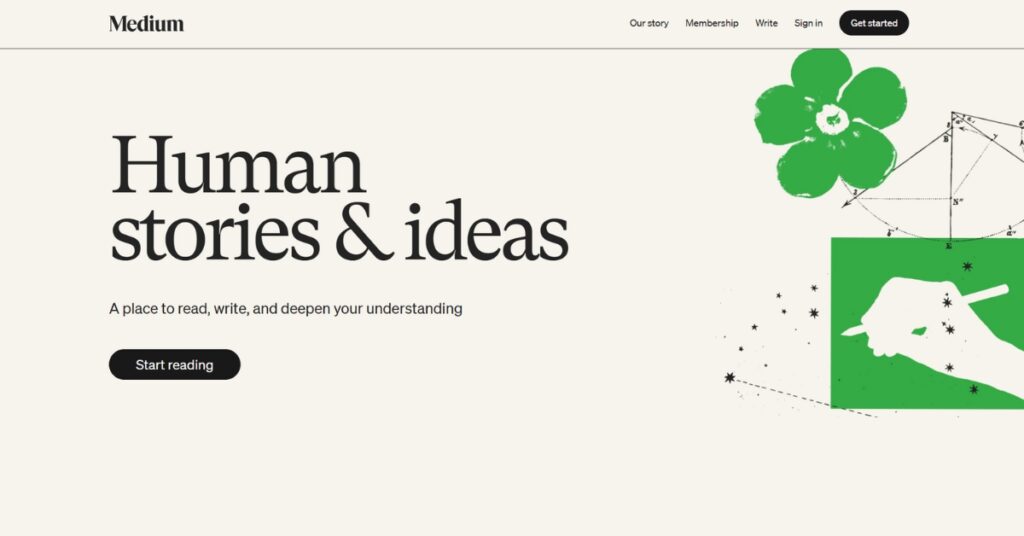
Features and Ease of Use
Medium is designed for simplicity and ease of use. Users can sign up quickly and start writing without navigating a complex dashboard, just a straightforward “Write” button. The platform offers essential blogging tools that allow users to add text, images, and videos easily. Notably, Medium integrates with Unsplash for images and YouTube for videos, enhancing the content creation process.
- Distraction-Free Writing: Medium’s writing environment is clean and focused, allowing writers to concentrate on their content without unnecessary distractions.
- Topic Categorization: Before publishing, users can categorize their posts by topic, which helps Medium’s algorithms show the content to the right audience.
- Readership Stats: Medium provides built-in analytics to track how stories perform among readers.
For those interested in monetization, upgrading to a premium plan allows access to member-only stories and the opportunity to earn money from writing.
Customization and Design
Medium offers limited customization; all users share the same design and URL structure. While this uniformity ensures a consistent reading experience, it may not appeal to those seeking unique branding or design flexibility. Custom domain connections are available only through paid plans.
Community and Reach
One of Medium’s standout features is its built-in audience. When a story is published, it can reach readers through two main avenues:
- Open Platform: Stories are immediately available for anyone to see and share on social media or from the user’s profile.
- Distribution Networks: Medium uses algorithms to promote stories based on user interests, potentially placing them on the homepage or in relevant topic sections.
This dual approach enhances visibility and engagement, making it easier for new writers to gain traction without needing a pre-existing follower base.
Who Should Set Up a Free Blog on Medium?
Medium is ideal for:
- Aspiring Writers: Those who want to publish content quickly without dealing with technical setup.
- Content Creators: Individuals looking to tap into an existing audience immediately.
- Experimenters: Writers who wish to explore various topics without the pressure of niche constraints.
However, it’s important to note that Medium retains control over published content, meaning users may face limitations regarding branding and autonomy. If complete control over a blog is desired, transitioning to a platform like WordPress may be necessary as users grow.
In conclusion, while Medium offers an excellent starting point for new bloggers due to its ease of use and built-in audience, it may not suit those seeking extensive customization or ownership of their content. For many, it remains a valuable platform for sharing ideas and building a readership.
Blogger
Sometimes simplicity is key, and that’s where Blogger shines. As Google’s free blogging platform, it offers seamless integration with other Google services and a straightforward approach to blogging.
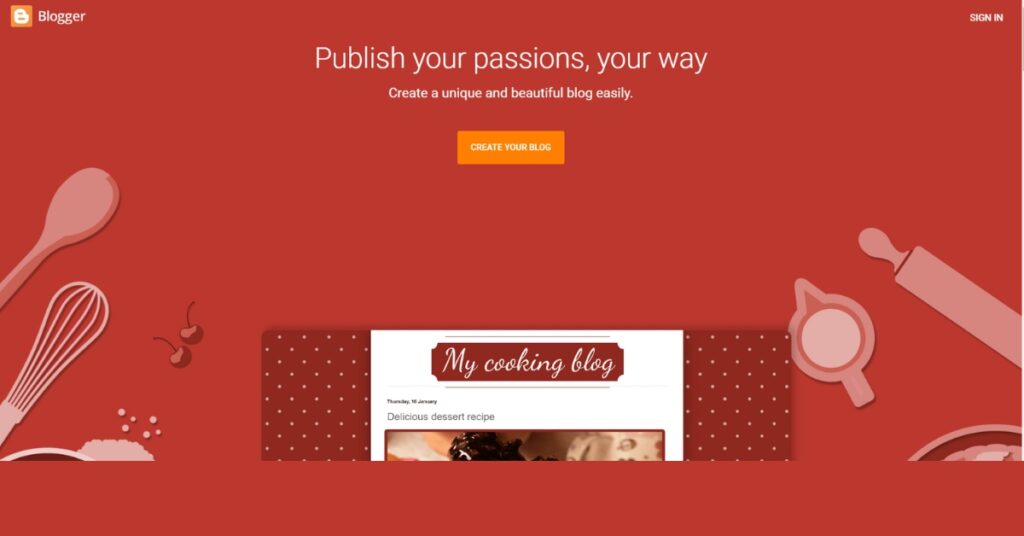
Notable Features
- Unlimited storage (with a fair usage policy)
- AdSense integration
- Custom domain support
- Basic template system
- Google Analytics integration
Perfect for beginners, Blogger requires minimal technical knowledge while providing all essential blogging features.
Pros:
- Free custom domain connection
- Unlimited storage for content
- Easy AdSense integration
- Reliable Google infrastructure
- Zero maintenance required
Cons:
- Limited design flexibility
- Basic template options
- Fewer modern features
- Dated interface
Feature-by-Feature Comparison
Let’s break down how these platforms compare across key metrics:
Ease of Use:
- Blogger (Simplest)
- Medium (Focus on writing)
- WordPress.com (Moderate learning curve)
- Wix (Easy design, complex features)
Customization:
- Wix (Most flexible)
- WordPress.com
- Blogger
- Medium (Most restricted)
SEO Capabilities:
- WordPress.com
- Wix
- Blogger
- Medium
Monetization Options:
- WordPress.com (Premium)
- Medium (Partner Program)
- Blogger (AdSense)
- Wix (Limited on free plan)
Making the Right Choice: Platform Selection Guide
Choosing the perfect platform depends on your specific needs and goals. Here’s a quick guide:
Choose WordPress.com if:
- You want a scalable platform
- SEO is a priority
- You plan to monetize in various ways
- You value flexibility and control
Choose Medium if:
- Writing is your primary focus
- You want immediate access to readers
- Do you prefer a clean, professional look
- Content distribution is a priority
Choose Wix if:
- Visual design is crucial
- You need an all-in-one solution
- You want creative freedom
- You plan to include non-blog elements
Choose Blogger if:
- You want ultimate simplicity
- Google integration is important
- You prefer minimal maintenance
- Basic blogging features are sufficient
Before making your final decision, ask yourself:
- What type of content will I create?
- How important is design customization?
- Do I need specific technical features?
- What are my growth plans?
- How much time can I invest in learning the platform?
Conclusion
Selecting the right free blogging platform is a crucial decision that can significantly impact your blogging success. Each platform offers unique advantages – WordPress.com stands out for its versatility and scalability, Medium excels in content distribution and professional networking, Wix impresses with design flexibility, and Blogger provides simplicity with reliable Google integration.
Remember, there’s no one-size-fits-all solution. The best platform for you depends on your specific goals, technical comfort level, and content strategy. Start by identifying your must-have features and long-term objectives, then choose the platform that best aligns with your vision.

